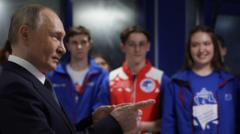In his address at the Arctic Forum, Putin positioned Russia for economic collaboration with the U.S. while stressing that competition in the Arctic is escalating.
**Putin Embraces American Arctic Ambitions Amidst Growing Tensions**

**Putin Embraces American Arctic Ambitions Amidst Growing Tensions**
As geopolitical competition heats up in the Arctic, Putin acknowledges Trump's Greenland proposal without criticism.
In the heart of the Russian Arctic, President Vladimir Putin has laid out his plan to bolster Russia's influence in the region, highlighting increasing global competition, especially concerning American ambitions for Greenland. Speaking at the Arctic Forum in Murmansk, Putin addressed the controversial idea proposed by former President Donald Trump to acquire Greenland, acknowledging its historical significance and emphasizing that these plans from the U.S. are serious business.
Putin notably refrained from criticizing Trump's aspirations, a diplomatic move indicative of recent efforts to thaw strained relations between the U.S. and Russia. "America's plans regarding Greenland are serious," said Putin. "It's clear that the U.S. will continue to strategically pursue its military-political and economic interests in the Arctic."
In a marked shift from the confrontational rhetoric of the Biden administration, the Kremlin is now advocating for economic collaboration in the resource-rich Arctic region. Kirill Dmitriev, Putin's envoy for foreign investment, expressed an openness to joint ventures with the U.S., particularly in logistics and sectors approved by Russian authorities. However, this willingness is contingent upon the resolution of the ongoing conflict in Ukraine, which continues to cast a shadow over U.S.-Russia relations.
Amid growing aspirations, there seems to be a quiet confidence in Moscow regarding their ability to engage with Washington based on mutual interests, even as critics in the West accuse Russia of resisting compromise. Dmitriev highlighted the importance of dialogue with U.S. officials, while recent comments from Donald Trump's envoy seemed to mirror Russian perspectives about the ongoing conflict in Ukraine, showcasing a potential alignment of opinions between the two nations.
Reflecting on the changing geopolitics, Nikolai Patrushev, a high-ranking aide to Putin, noted the evolution from a unipolar to a multipolar world, suggesting that competing U.S. political factions create opportunities for differing forms of engagement with Russia.
In a symbolic gesture, a giant inflatable whale installation in Murmansk attracted attention, serving as a focal point for citizens discussing the future of Arctic collaboration. While opinions vary on America's status as a "friendly country," many locals expressed a desire to support cooperation with perceived powerful allies. Dmitriev even named tech giant Elon Musk as a potential partner in space ventures, citing Russia's nuclear technology capabilities as a unique asset for explorations beyond Earth.
As the Arctic becomes an increasingly strategic battleground, the potential for cooperation juxtaposed with historic distrust could shape the future of international relationships in the region.
Putin notably refrained from criticizing Trump's aspirations, a diplomatic move indicative of recent efforts to thaw strained relations between the U.S. and Russia. "America's plans regarding Greenland are serious," said Putin. "It's clear that the U.S. will continue to strategically pursue its military-political and economic interests in the Arctic."
In a marked shift from the confrontational rhetoric of the Biden administration, the Kremlin is now advocating for economic collaboration in the resource-rich Arctic region. Kirill Dmitriev, Putin's envoy for foreign investment, expressed an openness to joint ventures with the U.S., particularly in logistics and sectors approved by Russian authorities. However, this willingness is contingent upon the resolution of the ongoing conflict in Ukraine, which continues to cast a shadow over U.S.-Russia relations.
Amid growing aspirations, there seems to be a quiet confidence in Moscow regarding their ability to engage with Washington based on mutual interests, even as critics in the West accuse Russia of resisting compromise. Dmitriev highlighted the importance of dialogue with U.S. officials, while recent comments from Donald Trump's envoy seemed to mirror Russian perspectives about the ongoing conflict in Ukraine, showcasing a potential alignment of opinions between the two nations.
Reflecting on the changing geopolitics, Nikolai Patrushev, a high-ranking aide to Putin, noted the evolution from a unipolar to a multipolar world, suggesting that competing U.S. political factions create opportunities for differing forms of engagement with Russia.
In a symbolic gesture, a giant inflatable whale installation in Murmansk attracted attention, serving as a focal point for citizens discussing the future of Arctic collaboration. While opinions vary on America's status as a "friendly country," many locals expressed a desire to support cooperation with perceived powerful allies. Dmitriev even named tech giant Elon Musk as a potential partner in space ventures, citing Russia's nuclear technology capabilities as a unique asset for explorations beyond Earth.
As the Arctic becomes an increasingly strategic battleground, the potential for cooperation juxtaposed with historic distrust could shape the future of international relationships in the region.




















